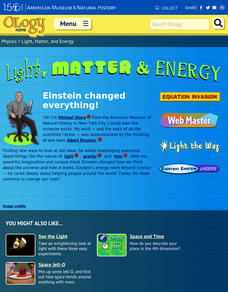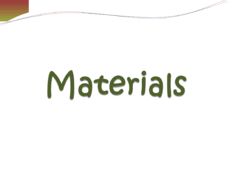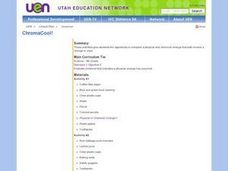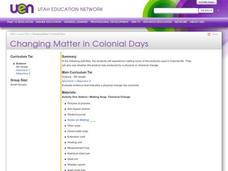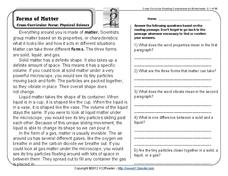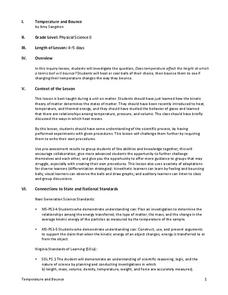Nevada Outdoor School
Let It Snow! Let It Melt!
Winter weather offers a great opportunity to teach young scientists about the states of matter. This activity-based lesson includes a range of learning experiences, from experimenting with the rate at which ice melts to singing a song...
Curated OER
Science: The States of Matter
Third graders conduct experiments in matter to create chemical changes resulting in gases. By mixing solids and liquids, they create a chemical reaction and capture the gas in balloons. After observing the balloons fill with carbon...
American Museum of Natural History
Light, Matter and Energy
Let Einstein's work shine the way. Pupils read about Einstein's iconic equation, E=mc^2, using a remote learning resource and see how ideas from other scientists such as Kepner, Curie, Galilei, and Newton led to its discovery. They...
Concord Consortium
Molecular View of a Liquid
Pour on the knowledge with an engaging states of matter interactive! Young physical scientists view the atoms within a liquid to explain what gives a liquid its unique properties. The resource allows users to highlight and observe two...
Curated OER
Liquids and Solids: Materials
Investigate the properties of solid and liquid materials. This very complete slide show is perfect for introducing liquids and solids to children in grades one or two. It describes multiple properties of solids, metals, plastics, wood,...
Curated OER
Understanding Chemical and Physical Reactions
For this chemical and physical reactions worksheet, students read a 2 page science article, answer 10 statements as true or false, give 2 ways a chemical reaction is different from a physical reaction, answer 1 short answer question and...
Curated OER
The Nature of Chemical Change: Acting Out An Example
Young scholars illustrate the molecular nature of matter and show that chemical change involves alteration of molecules.
Curated OER
What is an Atom?
Third graders understand that the smallest particle is an atom. In this matter lesson, 3rd graders make a piece of aluminum smaller and smaller to see that what's left is still aluminum. Students recognize that cutting into smaller...
Curated OER
What's The Matter?
Fourth graders accurately describe various states of matter, Through experimentation, they change a variable to create a new state of matter. Students record their observations about the way matter is changed and the changes that occur...
Curated OER
ChromaCool!
Fifth graders watch a video about physical and chemical changes. In groups, they participate in a variety of activities involving color. They write their observations in a journal. To end the lesson, they use a checklist to classify...
Curated OER
Colonial Life
Fifth graders explore American colonial life. In this interdisciplinary history and science lesson, 5th graders participate in several hands-on activities that require them to make colonial products that involve physical or chemical...
Curated OER
Food Matters
Fifth graders identify physical and chemical changes. In this science inquiry lesson, 5th graders observe the changes that occur when making bread and butter. Students explain if the product is result of a physical or chemical change.
Curated OER
Constancy and Change
Second graders identify three forms of matter- solids, liquids, and gases with 100% accuracy. They observe what happens when they try to put two kinds of matter into the same space and conclude that solids, liquids, and gases occupy space.
Curated OER
It Matters
Students use descriptive vocabulary to discuss the attributes of matter. Then, they sort objects or pictures by the type of matter they are comprised of. Finally, students match objects of matter with similar attributes and create a...
K12 Reader
Forms of Matter
In this forms of matter worksheet, students read a 4 paragraph article about forms of matter, then complete a set of 5 short answer comprehension questions.
Curated OER
Exploring Phases of Matter
Students discuss and experiment with the phases of water. In this phases of matter activity, students recognize the different states of matter. Students measure and record changes and understand when the state changes.
Curated OER
Water and Ice
Students investigate how water changes state. In this water lesson, students observe, measure, and describe water as it changes state. This lesson includes extensions which can be accessed via the provided web links.
Curated OER
State of Matter - Atoms
Learners examine and discuss how atoms change from solid to liquid to gas. They inflate a balloon by melting ice that converts to steam, and discuss the results.
Curated OER
What Is the Matter with Water?
Second graders observe matter in all 3 states : liquid, solid and gas, in an ice cream soda. In teams, they are given ice and teams compete to be the first to melt their ice. Winner gets the ice cream soda. They draw examples of 3 states...
Curated OER
The Same But Different
Fourth graders identify the characteristics of a simple physical change. They describe objects by the properties of the materials from which they are made. Students discuss the different states of matter and their distinct physical...
National Nanotechnology Infrastructure Network
Making a Liquid Crystal Thermometer
Introduce your classes to a fourth state of matter! Liquid crystals have a colorful sheen that changes based on different physical factors. Learners use this information to create a liquid crystal thermometer where the color of the...
STEM for Teachers
Temperature and Bounce
Take part in a fun experiment and hold an impromptu bouncing contest with your class. Young scientists heat and cool balls before bouncing them to determine whether temperature changes affect how they bounce. The set of STEM lesson plans...
K12 Reader
Solids, Liquids, & Gases
Solids, liquid, and gas, the three states of matter, are the subject of a cross-curricular reading comprehension exercise that asks kids to first read an article about these forms, and then to respond to a series of questions based on...
Center for Learning in Action
Gases
Explore the properties of gases through one activity and two investigations in which super scientists observe the changes gas makes when encountering different conditions.




